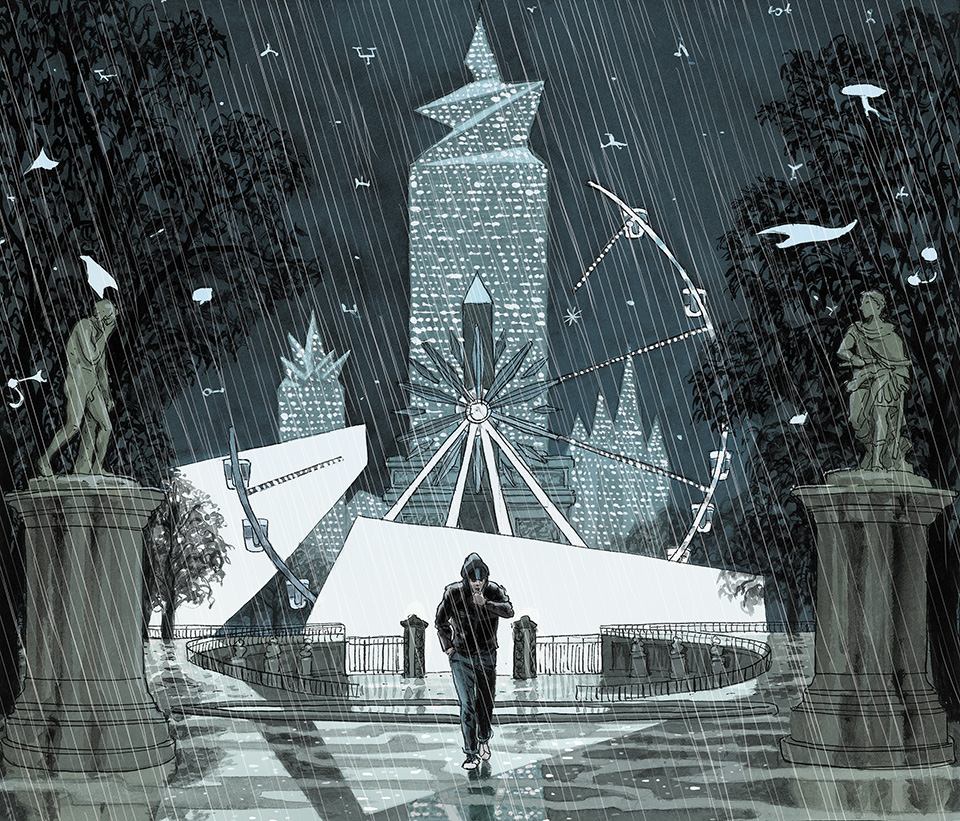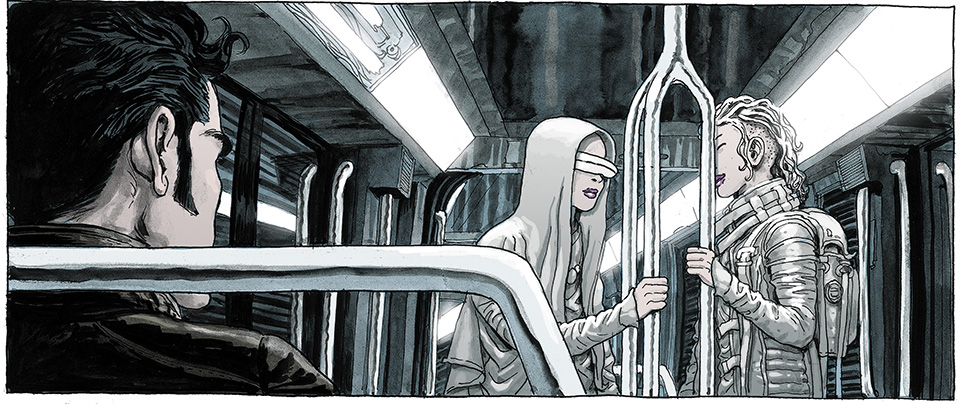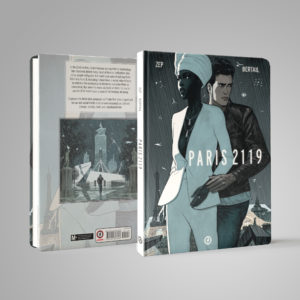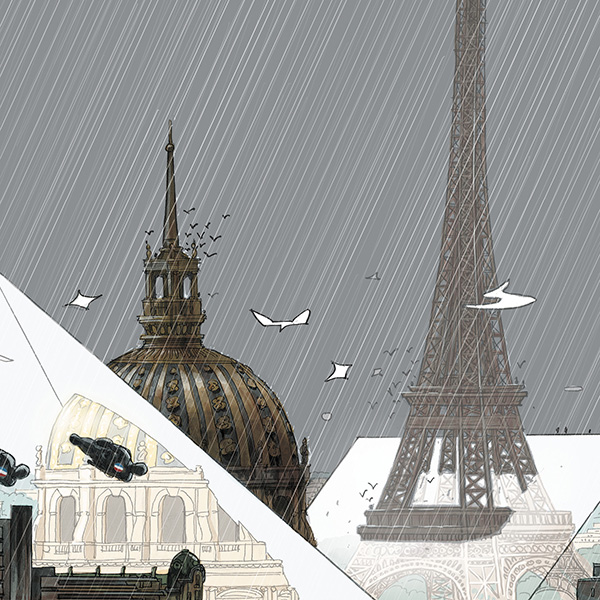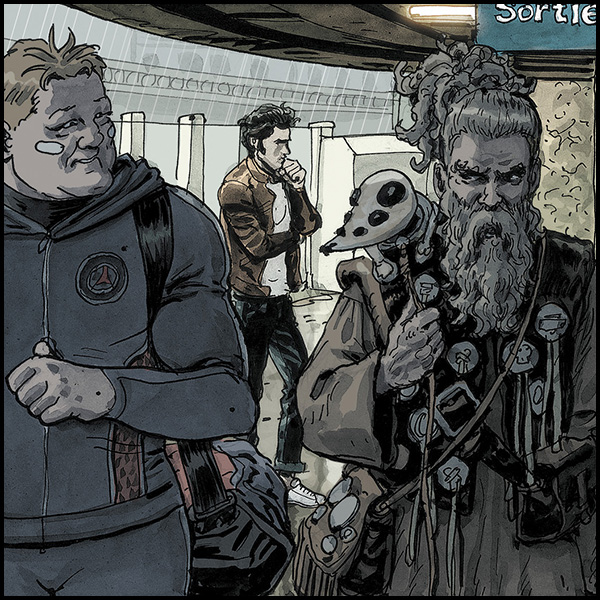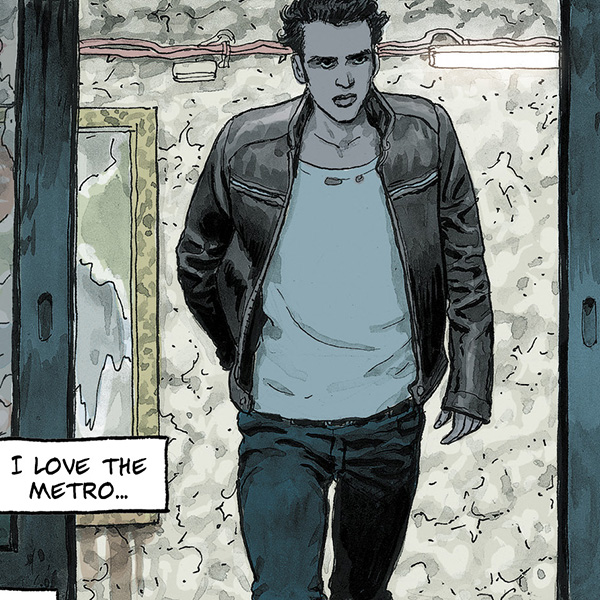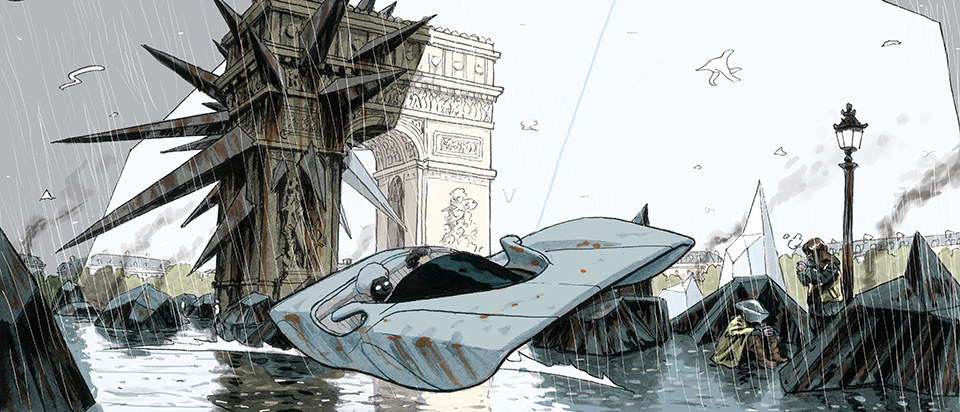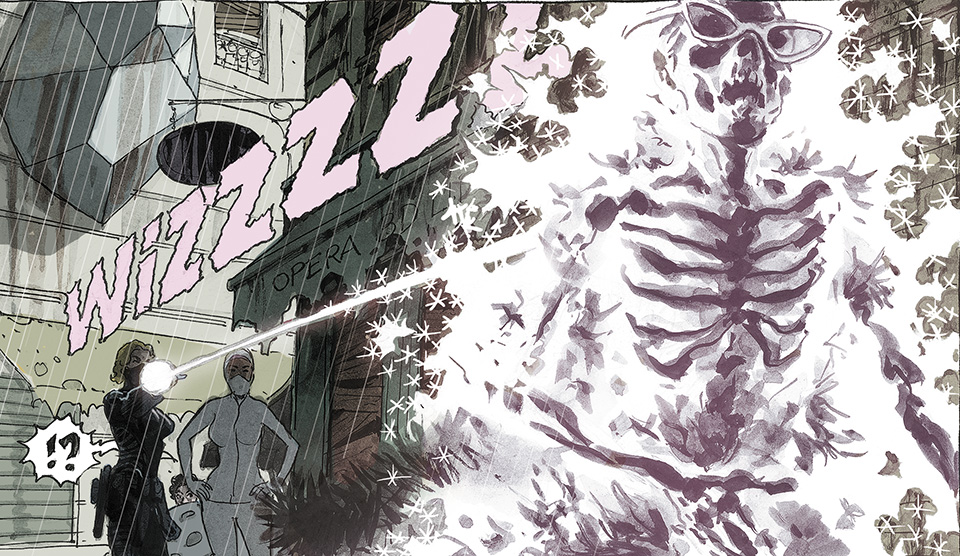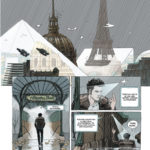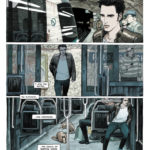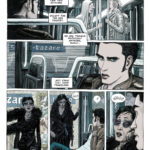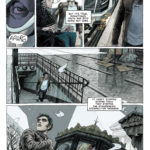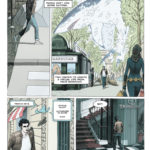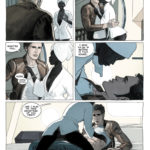Comicbookresources.com interviewed ZEP and DOMINIQUE about the project, and here’s what they had to say…
CBR: You two have already worked together on Infinity 8 volume 1, so Paris 2119 wasn’t your first time working together. In general, what does your collaborative process look like and has it changed for Paris 2119?
ZEP: We don’t live in the same city (not even in the same country — I’m in Switzerland and Dominique is in France), so it’s a remote collaboration. I always need to create my own storyboards for my scripts. Dominique read them and then signed on to create it. We met once to talk about the points he wanted to change and the vision he had for the characters. I was like a child in front of the Christmas tree waiting to see the pages come in and watching the story come to life.
DOMINIQUE BERTAIL: Zep gave me the whole story in the form of a set of storyboards. My job was to focus on a vision of futuristic Paris and on the relationship of the main couple. Everything happened very easily. I think we were on the same page from our first meeting. I hope I didn’t distort what Zep had in mind.
Science fiction is always, at least in one way or another, about the period when it is written, and this is a book that addresses many contemporary questions. For you, how does Paris 2119 work as a social commentary?
ZEP: We didn’t plan on this as any contemplation of the empty Paris as it happened this year (with the quarantine)… Our idea was about evolution and increasingly entrusting our life and its constraints to technology. As a result, we are a species that has hardly evolved for millennia, living in an ultra-technologically evolved society, over which almost none of us have a firm grasp. We have gradually surrendered our daily lives, our movements have less and less purpose, as we’ve seen with in this time of COVID-19. Teleportation, digital travel, seems to me to be a pretty logical next step in our surrender to technology.
DOMINIQUE: I would have a hard time commenting… I trusted Zep for the meaning of the story. I just let myself be carried away.
For the design of the city, I closed my eyes and let my subconscious build a Paris of the future. The images just imposed themselves. A two-speed Paris, the difference between the beautiful neighborhoods of the old Paris which became more and more pronounced as public monuments become privatized, and their neighborhood connections disappeared… The city is changing.
Regarding Kloé and Tristan, I wanted to present an interracial couple because I think it’s not only beautiful, but I find them exciting and rewarding together. Kloé is African and I wanted her to be socially powerful enough to counterbalance Tristan, who is more bohemian. I think in a relationship, everyone has to make the other person dream. I tend to believe that Africa will be the most prosperous and powerful continent in the near future. An immense wealth of biological diversity, a reserve of natural resources, a young population… Of course, that’s not the subject of this story, but these are ideas that I used to define them as a couple. And I like the idea that this relationship isn’t even addressed as a subject.
Representing a deserted city was more of a fantasy. Empty Paris! What a pleasure for the urban walkers that we are, Zep and I. And then COVID-19 happened… Strange… Next time, I’ll draw a future paradise!
What struck me in the art of Paris 2119 is the kind of imposing solitude caused by teleportation that replaces most other modes of transport. Tell me a little bit about exploring this relationship between technological progress and physical isolation.
ZEP: Progress is the gradual erasure of constraints. In travel, however, it is precisely these constraints that we remember the most. We remember the unexpected surprises, the missed plane, the broken-down train, unexpected encounters… the adventure! Computers don’t understand adventure. They analyze all the unforeseen potential for our comfort… but that kills the adventure. And that comfort isolates us. Tristan says, “isn’t travel time necessary to anticipate your new destination?” I think so.
Dominique, in past interviews, I’ve heard you talk about how, for Paris 2119, you created a past for this future in order to ensure that the Paris of the future is authentic. Can you tell me a little bit about this process of creating an authentic image of the future?
DOMINIQUE: To make the future city more credible, I imagined a history leading to that future: a period of strong public works of art that invaded the city (structures with aggressive points that infected old buildings, like a metal virus). But then they would have aged and rusted with time… The beautiful quarters would have been restored and the old metal sculptures would have been removed. But in the abandoned neighborhoods, the carcasses of those works of art would still be there. A new generation of artists reinvented the place by creating wooden and cardboard huts to house the homeless. Everywhere, the old rubs shoulders with the modern, all layers of evolution would co-exist. I tried to make it all as mundane as possible, as if we were used to seeing Paris like this. I drew neighborhoods that are very familiar to me, places where I’ve lived, to reinforce this feeling of normality. The melancholy of the constant rain adds to this feeling of “deja-vu.”
Paris 2119 was originally published in 2019, and a lot has happened since then, to say the least. Has last year changed your feelings about the content of the book? Are there any places where you feel you’ve made a mistake?
ZEP: All authors of speculative fiction hope to be wrong. They imagine the worst, so that it won’t happen. I’m a rather natural optimist, but I have the feeling humanity is having a hard time changing its trajectory.
DOMINIQUE: I don’t think we’re talking about the future, but rather a caricature of the present. Or rather sharing a nostalgia for the present.
With regard to the actual translation of Paris 2119, to what extent are you both involved in Magnetic Press’s release to the English-speaking world?
ZEP: I always choose to trust my publisher. In comics (which represents the majority of my writing) it is sometimes more a matter of adaptation than of translation. And when your book is translated into Chinese or Turkish, all you can do is trust…
How do you expect readers outside France to connect to the themes and ideas of the book?
ZEP: It’s very exciting to be published in the US, which is the capital of Science Fiction! Can’t wait to hear the reactions of readers. As soon as you make a story of speculation, there tends to be an American atmosphere… even if it takes place in Paris.
DOMINIQUE: I dared not imagine an American edition of Paris 2119. I’m flattered and happy!! But I’m a little nervous! I have no idea how it will be perceived! For me, this album is a declaration of love to a city that I love, that I left and that I miss. Neither heavenly nor apocalyptic, majestic and flamboyant, dark and melancholy, dangerous and chic.
Mike, what was your reaction when you first read Paris 2119 and why was this a book you wanted to bring to the English-speaking world?
MIKE: I’ve been a fan of both Zep and Dominique’s work for quite a while, so a collaboration between the two was an immediate draw. Their collaboration on Infinity 8 was a lot of fun, but this story was a lot more intriguing, like an awesome episode of Black Mirror or Twilight Zone. So much of it reflected society when I read it a year ago, but so much more of it is relevant now. Hopefully it doesn’t presage too dark a future in real life!


